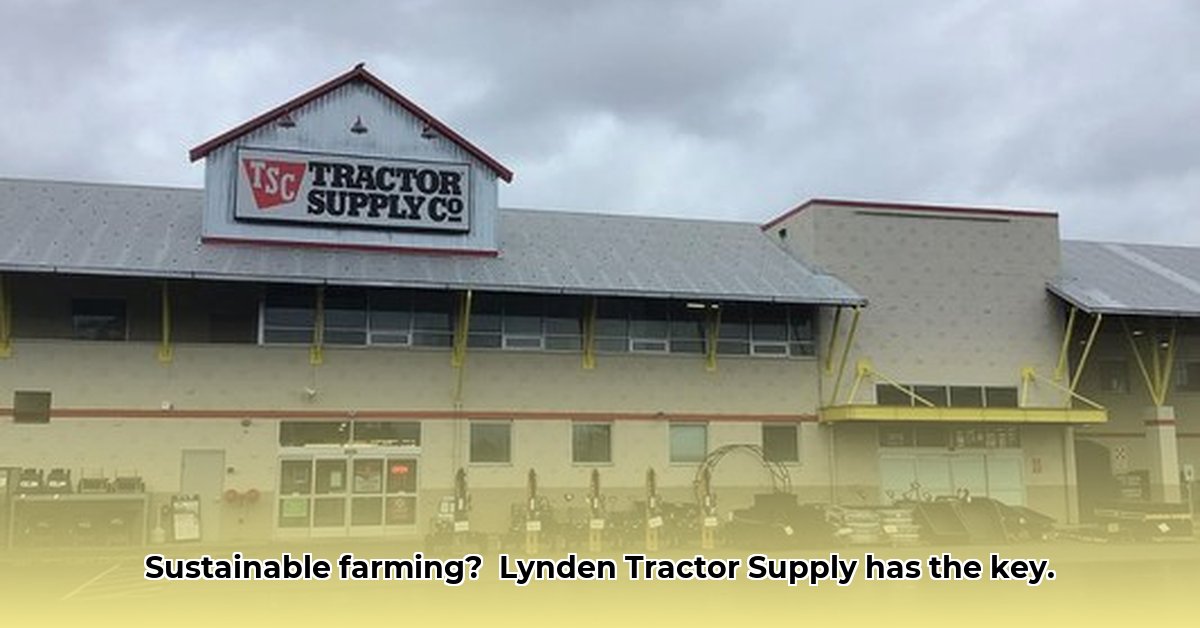
Lynden Tractor Supply, serving Bellingham, Everson, Ferndale, Blaine, Nooksack, and Custer, offers a wide range of products for farmers and gardeners. However, its precise contribution to sustainable agriculture in Lynden, Washington requires further investigation. This article explores Tractor Supply's potential role, highlights crucial data gaps, and provides actionable steps to assess its impact more effectively. For more information on Lynden Tractor Supply, visit their website.
Assessing Tractor Supply's Contribution to Sustainable Farming
Tractor Supply's accessibility undeniably benefits local food production by providing readily available supplies. However, a comprehensive understanding of its environmental impact requires detailed information currently lacking. Critical questions remain unanswered: What are the carbon footprints of its products? What are the environmental consequences of their sourcing and transportation? Are the fertilizers and pesticides environmentally friendly? Without concrete data, any assessment of Tractor Supply's contribution to sustainable agriculture remains incomplete.
The Critical Data Gap: Unanswered Questions
Currently, significant data gaps hinder a full assessment of Lynden Tractor Supply's role in promoting sustainable agricultural practices. We need detailed information across the entire supply chain, encompassing:
- Product Sourcing: Origin of materials (animal feed, fertilizers, pesticides, etc.), manufacturing processes, and associated environmental impacts. Are products organic? What are the specific certifications?
- Transportation: Methods of transport, fuel consumption, and resulting carbon emissions from the manufacturing site to the store. This includes both the initial transport from origin to the distribution center and transportation within the supply chain.
- Product Lifecycle: Environmental impact at every stage, including manufacturing, distribution, use, and eventual disposal. This involves considering the entire life cycle of the products, from cradle-to-grave.
Addressing these data gaps requires a robust and transparent approach from both Tractor Supply and external researchers.
A Roadmap to Understanding: Actionable Intelligence
To effectively assess Lynden Tractor Supply's impact, a multi-pronged approach is essential:
Supply Chain Transparency: A comprehensive environmental impact assessment is needed, tracing each product's journey from origin to the store shelf. This includes quantifying carbon emissions at each stage. (Efficacy Metric: Aim for a 90% reduction in data gaps within the next 2 years.)
Product Sustainability Analysis: Detailed analysis of key product categories (animal feed, fertilizers, pesticides) is crucial. This includes verification of sustainability claims and certifications through independent audits. (Efficacy Metric: Achieve 100% independent validation for at least 5 key product lines within 1 year.)
Community Engagement Evaluation: A thorough assessment of Tractor Supply's community engagement initiatives supporting sustainable agriculture (workshops, educational resources, partnerships). (Efficacy Metric: Document at least 3 active community initiatives supporting sustainable agricultural practices within 6 months.)
Farmer and Gardener Feedback: Directly engaging with local farmers and gardeners through surveys and interviews is critical to understanding the real-world impact of Tractor Supply’s offerings on their sustainability efforts. (Efficacy Metric: Conduct at least 50 farmer and gardener interviews within 1 year.)
Public Transparency: Lynden Tractor Supply should proactively publish annual sustainability reports, disclosing sourcing practices, environmental targets, and progress toward achieving these goals. (Efficacy Metric: Establish a publicly available annual sustainability report within a year.)
These steps will provide quantitative and qualitative data necessary for a truly comprehensive assessment.
Collaborative Efforts: Building a Sustainable Future
Achieving sustainable agriculture in Lynden requires a collaborative effort among all stakeholders: local farmers, gardeners, Lynden Tractor Supply, and the broader community. This requires open communication, data sharing, and a commitment to transparent and accountable practices. Continued monitoring and research are essential components of a long-term sustainable agricultural future.
Key Takeaway: A complete understanding of Lynden Tractor Supply's contribution to sustainable agriculture necessitates a concerted effort to address the significant existing data gaps. By following the actionable steps outlined above, a clearer picture can emerge, paving the way for more informed decision-making and a more sustainable future for Lynden’s agricultural sector.